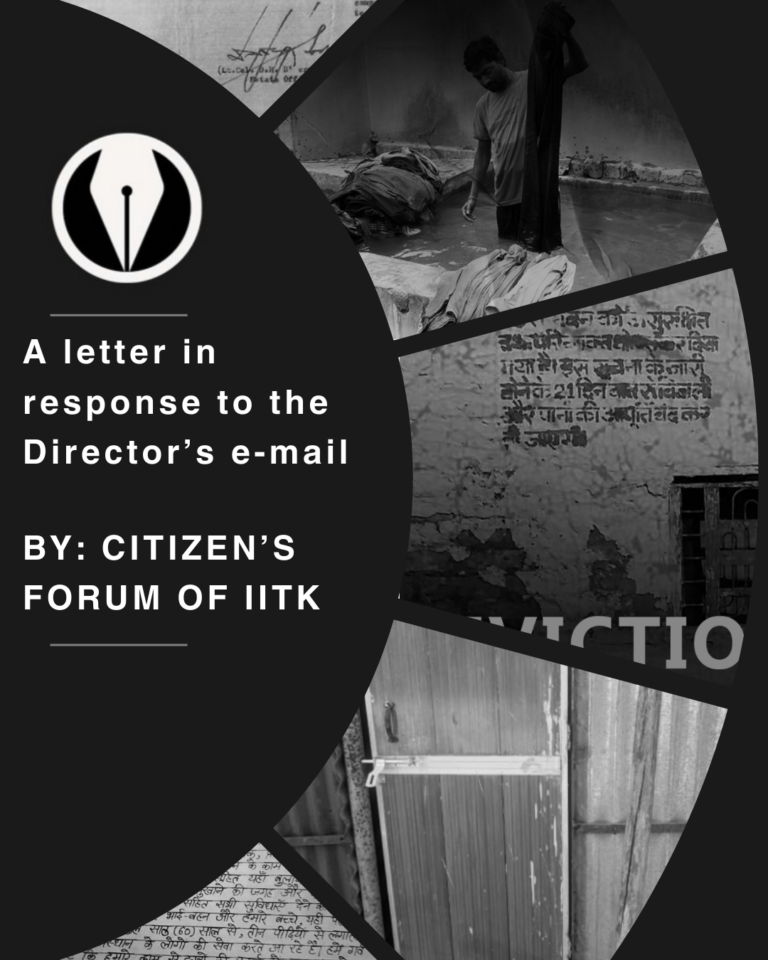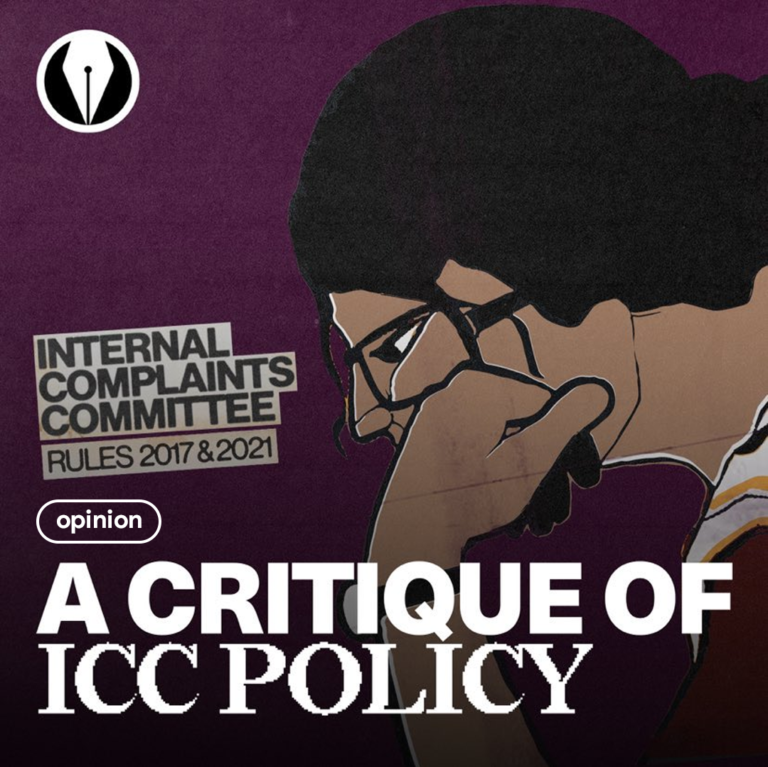Are you an undergraduate student at IIT Kanpur? Have you had bad experiences with the UG section of the Academic Affairs Office? Have you ever been told by your batch’s Dealing Assistant, your department’s Convener, DUGC or the Institute’s Chairman, SUGC that you can’t do something (which, to you at least, is) completely reasonable simply because it is against the rules in the UG Manual? If you answered “yes” to these questions, this article is for you!
One of the major drawbacks of being part of an institution as old and big as ours is that there tend to be a lot of rules, and, more often than not, there will always be somebody who wants an exception to the rule. This could be anything, ranging from a student falling one credit short of completing his ESO/SO credits, to a student needing three semester drops on medical grounds (where the UG Manual allows only two). These vary from commonly occurring requests, such as a request to drop a course after the last date specified in the Academic Calendar (something that neither the Chairman, SUGC nor the Chairman, SPGC will ever approve, to prevent setting a dangerous precedent) to very rare requirements, such as the above-mentioned request for three consecutive semester drops. Hence, any self-respecting system like IIT Kanpur’s would have a mechanism to handle these special cases, wouldn’t it? Why yes, yes it would: this mechanism is called the SUGC.
What does this mean? On paper, the SUGC (Senate Undergraduate Committee) is a Standing Committee of the (academic) Senate of the Institute, and advises the Senate on all matters pertaining to its Undergraduate academic programmes. In practice, this includes making policies, as virtually every new academic policy will either have originated from the SUGC itself, or will go through the SUGC before it is even admitted for consideration in the Senate. This also includes routine decisions that have to be taken by the SUGC, as delegated by the Senate either through the Senate Manual or the UG Manual, including, but not limited to, approving semester drops, recommending cases to the Senate or Chairman, Senate for termination on various grounds, recommending branch changes to the Senate, approving the conversion of programmes from BS/BT to Dual Major or Dual Degree (all categories), approving new courses, approving exchange programme requests and so on, all of which are done in formal SUGC meetings and others such as approving course drops and leave applications, which are done outside SUGC meetings by the Chairman, SUGC and the Convener, DUGC.
However, while these are major aspects of the SUGC’s function, a key aspect (whether implicit or explicit, I’m not entirely sure) of its function that faculty members (especially some members who served on the SUGC alongside me) often forget is that of providing a decision-making mechanism for exceptions. If the rules that the Senate had prepared were perfect and complete, there would be no need for an entire committee – for every case that would ever come forward, the DOAA office would simply look up what the relevant rule says and execute it. This, however, is not the case – there is a certain amount of subjectivity to a large number of the rules, empowering the SUGC’s organs (viz. the committee itself, its Chairman, and its individual members as Conveners of their respective DUGCs) to use their discretion in particular scenarios. Thus, I could argue that the SUGC exists for special cases – all the other major aspects of its work could easily have been done by either a single individual or by other extant bodies in the Institute such as the Head’s Group, the Institute Advisory Committee or perhaps the Senate itself.
In this aspect, the biggest power vested in the SUGC is the Waiver Clause, the brahmastra of all clauses in the UG Manual. Clause 16.1 [colloquially known as the Waiver Clause] of the current approved UG Manual states the following:
“16.1 Waiver
The procedures and requirements set out in this manual, other than those in
Chapters 3, 7.2, 8, and 9, may be relaxed or waived in special circumstances by SUGC. All such exceptions are reported to the Senate.”
The chapters mentioned above are not something a student would ordinarily like to waive anyway, including things such as degree requirements, admission, evaluation, and inadequate academic performance. Thus, with this clause, the SUGC can strike down any rule temporarily for a single student or a group of students, for bona fide reasons. The best part about this clause is the fact that it does not require the approval of the Senate – the SUGC’s approval is all that is required, and while the Senate could, in principle, overturn the SUGC’s decision, this is unlikely and unprecedented for at least the years I’ve been on campus. It cannot be stressed how great a benefit this is – it is a lot easier to convince ~10-15 odd faculty members to make an exception for a special case; it is a lot harder to convince a body which could potentially have all Professors attending its meetings to bypass one of the rules that it itself created.
Well, great, so this clause exists. How does one go about actually using it for their benefit? The first step is knowledge (the more you know, eh?). Once you know that this clause exists, you are empowered – if the Chairman, SUGC tells you something is not possible you can tell him he’s wrong; the waiver clause makes it possible, even if not plausible. However, if you want to go around using this clause to your benefit, I highly recommend not antagonizing the Chairman, SUGC like this – instead, I suggest you either contact the Students’ Senate Nominee to the SUGC of the 4th Year batch (there will always be one due to the structure of the SUGC; at present this is Praveen Honhar) or you contact the Convener, DUGC of your department, depending on what you are comfortable with. In general (though this largely depends on the quality of the Students’ Senate Nominees), I would personally recommend talking to the student member first. While the Waiver Clause can potentially be used for anything, it is constrained by precedent (the ways it has been used in the past, as well as the ways it explicitly hasn’t been used) as well as by the sensibilities of the SUGC at that time. Thus, the student member will have a fair idea of what kind of waiver is likely to get accepted, and can guide you regarding this. Once you’ve crossed the student member, you will have to go and talk to your Convener, DUGC as well as (before or after you meet him/her) have to talk to other faculty in your department to lobby your case in your department. An exceptional request without the departmental faculty’s support behind it is unlikely to get much traction in the SUGC, and conversely, a request which has the unequivocal support of the faculty and/or the Convener, DUGC is unlikely not to get passed when it comes up in the SUGC. As a final step, it is considered good form to discuss your issue at least once with the Chairman, SUGC as he will be the one finally summarising the decision for your case, and overseeing the implementation of the SUGC’s decision. It is best, thus, to keep all three legs of the SUGC (viz. the student members, the departmental faculty representative, and the Chairman) that a student can contact involved in the case/issue to ensure that the requested waiver passes in the SUGC.
Written by Anurag Sahay, a fifth year BS-MS student of the Dept. of Mathematics and Statistics. He was a students’ senate nominee to the SUGC for three consecutive academic years, from 2012-2015, and the Chairperson, Students’ Senate in the Gymkhana Year 2014-15.
The views conveyed in the article are solely of the author. The opinion section of Vox Populi provides a platform for the campus junta to voice their opinions





![[EDITORIAL] Is the institution failing somewhere?](https://voxiitk.com/wp-content/uploads/2026/01/1-2-768x960.png)






